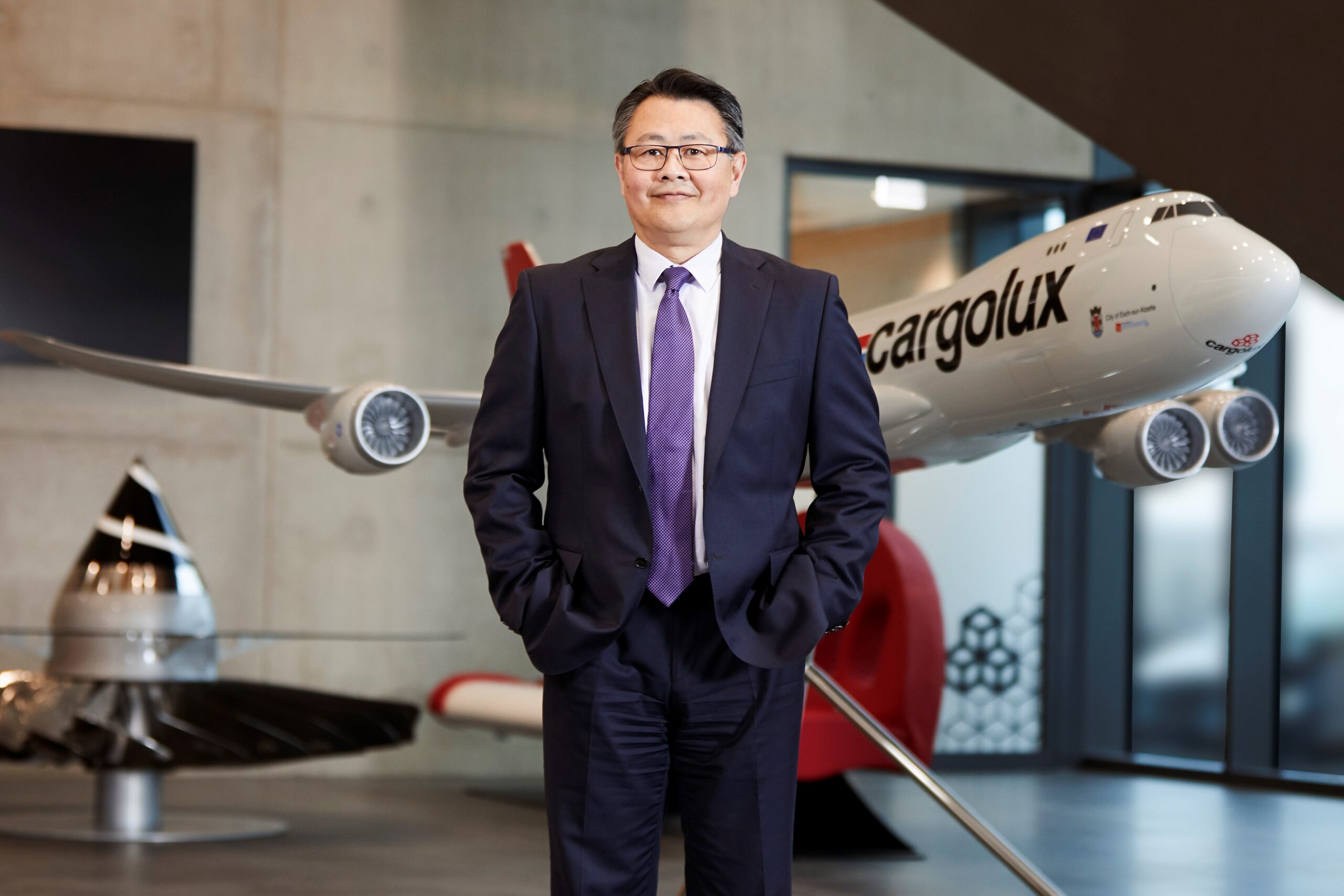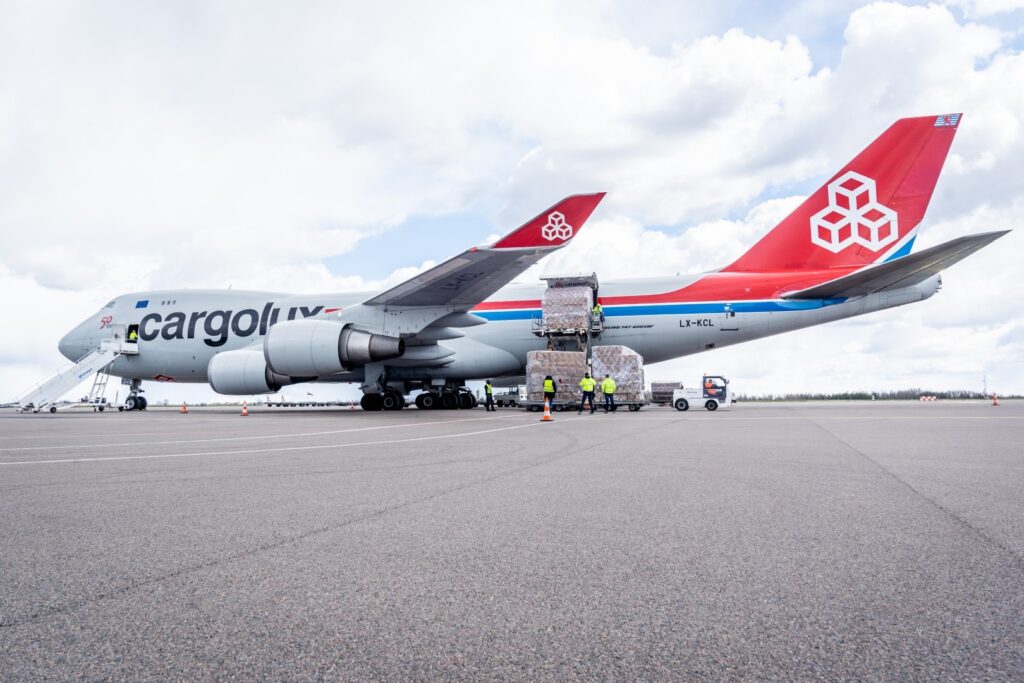Cargolux’s Forson fears freighter boom will see air cargo bubble burst
04 / 07 / 2022

Richard Forson. Photo: Cargolux
Cargolux is exercising caution when it comes to freighter fleet investments and with good reason, president and chief executive Richard Forson tells Roger Hailey.
Forson takes the longer term view of the air cargo industry and will not make million-dollar freighter fleet investment decisions based on the industry’s current boom.
The Luxembourg-based cargo airline, with 30 Boeing 747 freighters in its fleet, reported record revenues of $4.4bn in 2021, an increase of 40% over the previous 12 months, with a profit after tax of $1.3bn, an increase of 68% over 2020.
Despite those strong financial results, Forson is a realist who knows that surging demand for airfreight over the past two years was fuelled by the Covid pandemic, but today is still an uncertain world with a global economy facing fresh threats that may spoil the airfreight party.
The war in Ukraine with airspace restrictions, the zero-Covid policy in China that may see lockdowns curbing manufacturing capacity, soaring energy prices and global inflation are factors that could dampen consumer demand and so cool airfreight’s red-hot market.
Forson says: “Current market volumes are softening a bit in terms of demand, and I think this is driven principally by China’s zero Covid policy that has had an impact on manufacturing, which in turn impacts all those manufacturing facilities outside of China and also consumer demand, because they are not getting the finished products.”
The Shanghai lockdowns, both at the world’s largest maritime container port and the world’s second largest pure air cargo airport, have hit the supply chain in and out of China.
In Shanghai the lockdown meant that Cargolux’s operations people could not get to the airport: “We had to find alternative means of trying to reinstate frequencies when the lockdown kicked in.”
Cargolux currently (mid-May 2022) has two flights a week into Shanghai with loadmasters on board. The aircraft are handled on the ground by a local Chinese company: “Obviously we try to have our employees do as much as they can, but this situation has an impact on our operations and also on the distribution of goods out of Shanghai for export which are subject to restrictions as well.”
The airline has managed to maintain freighter frequencies at its other Chinese hub, Zhengzhou (CGO) although there has been occasional congestion affecting imports, but this backlog has cleared up. The situation at Hong Kong’s airport has also stabilised.
The air cargo industry is now turning its eyes towards the traditionally busy fourth quarter. What are Forson’s thoughts on the prospects in terms of demand and available capacity, given that most of the market will be without the 17 B747Fs and one B777F fleet of Russia’s AirBridgeCargo?
“As you get into the peak season there are a lot of additional flights put into the system because of the cyclical nature of air cargo, but over the last two years the cyclical nature wasn’t really there, it was full steam ahead throughout the year.”
Forson says that some cyclical cargo movements have returned this year and that demand remains high, although the lockdowns in China have a dampening effect.
“The exit of AirBridgeCargo capacity out of Asia through into Europe has been taken up very quickly by other freight operators. But to a certain extent that has been mitigated by the lockdowns which have forced airlines to reduce operations into and out of China.”
Will there be sufficient airfreight capacity for the looming peak season, and will rates maintain their high levels this year?
“A lot of it depends on production in Asia, especially China. Are they able to bring production back up to full capacity? There could be a peak season but whether it is a booming peak season depends on a lot of factors such as the price of the goods as well as the capability of the logistics players to get the product to market when it is required.
“Oceanfreight remains constrained and the ports’ ability to load and offload ships on a timely basis will mean some businesses are going to revert to air cargo to get their inventories to market.”
Forson adds: “Long-haul passenger services have not yet recommenced into China and preighters are going to stop from July 1 [in Europe], which means you can no longer load freight onto the main deck of passenger aircraft and load only into the bellies. There is possibly going to be a capacity crunch coming up in the peak season.”
Forson says that a sudden return to further lockdowns in China is difficult to predict.
“It is a very fluid situation because we are not given much time to prepare for any type of lockdown. There is always an overnight notice, so it is about having to remain agile and flexible.”
Dockworker labour unions on the West Coast are in negotiation this summer, which raises the prospect of strike action by dockers like that of 2016 when supply chains fractured. What could that mean for air cargo capacity?
“Ultimately, we are looking at a perfect storm if the US unions decide to go on strike at ports which are already struggling to handle container cargo.
“Whenever you have ports in shutdown there will be a heavy reliance on air transport, and you might see rates for what people are now prepared to pay going significantly higher.
“But from a Cargolux perspective, our major customers have block space agreements in place, and we honour those agreements, so they are obviously protected. Over the last couple of years we have seen freight forwarders go into wet leasing their own capacity to provide some kind of hedge against increasing prices of shipping products by air.”

Photo: Cargolux
Cautious approach to investment needed
Forson says that the last two to three years have been extremely lucrative for those in the logistics business and will possibly remain so for the next two to three years, but he cautions: “You have to think beyond that and consider what happens if there is an economic decline. If prices continue to increase and if interest rates continue to increase but inflation does not come down, then it is definitely going to impact consumer demand because we are getting into an area of stagflation.
The difference between short- and long-term thinking is very much a part of Forson’s mindset when it comes to freighter fleet replacement, be that passenger aircraft conversions or new models rolling off the production line in a couple of years.
Freighters of both types are very much back in fashion, but is the current market an inflated bubble that will burst in due course?
Forson says: “I think there is a high risk of a bubble developing because everybody is ordering freighters. Airlines that were exiting the freight market, especially combination carriers that were reducing their exposure to freight, all of a sudden they are again buying freighters. There are also all kinds of new entrants in the market for freighters.”
Forson observes that the narrowbody conversion market is primarily feeding the regional and domestic e-commerce business which has seen significant growth, both regionally, domestically and internationally, as consumers forced to work from home during the Covid first wave went online to buy goods and have continued to do so.
Converted freighters are certainly not Forson’s first choice.
“Cargolux has operated conversions before, but they are nowhere near as efficient as production freighters. I think everybody is very focused on the past two to three years and basing their fleet decisions on that, but I’m looking out further ahead.
“My preference is to buy new, and I look at the asset value and cost of operating over 20 to 25 years. Two to three years is only a small fraction of the total life of that asset on the balance sheet.
“And even if you go to a lessor, they are not going to lease it to you for two to three years unless you’re prepared to pay a huge premium which makes it extremely expensive.”
He continues: “It is easy for everybody in the logistics industry to make money in this kind of market and any airline with a cargo division that is not performing way above what it was in the past, I think they should close down.
“But once we go beyond the current situation and the market gets back into balance, then people are going to be sitting with freighters looking at what they’re going to do with them. Invariably, the market is flooded with capacity and then we go full circle once again.
“I take a much longer term view on fleet acquisitions I cannot base my key decisions purely on what has taken place in the last two to three years.
“What I have been doing is to build up the resilience of the airline and that provides us with a significant amount of our own liquidity to enter a fleet renewal programme. We are not overleveraged in terms of debt.
“That is the benefit of the profits being made now. Retain the money for the future and make the balance sheet a lot more resilient for any decline.”
What is Cargolux’s thinking on the next-generation Boeing 777- 8F and the Airbus A350 production line freighters?
“We are evaluating both aircraft at this stage in terms of how it will perform on the network we currently operate and our business model, which is to get the maximum utilization out of these aircraft.
“We have not taken a final decision, and once we are comfortable about what our recommendation will be, then I will take it to our Board for their consideration and approval.”
He makes the point that the Boeing 747 is very big freighter, whereas both the B777-8F and the A350F are smaller and are not nose-loading. The biggest advantage of the B747 is its nose -loading capability but also the weight of single pieces it can carry and the dimensions of cargo it can accommodate.
There are certain loads carried today on the B747 that neither of those replacement aircraft will be able to transport.
Says Forson: “I already have some customers raising the question about what will happen when all the B747 freighters are on the ground and how are they are going to transport their goods by air?
“From my side, I would like to be able to retain several B747s in my fleet going past their exit-by dates and keeping them serviceable to provide customers with the kind of capacity they require.
“Cargolux will be able to offer a unique product in the market for cargo that operators of the new generation freighters, the B777F and the A350F, will not be able to handle. Our aircraft will be used for special missions for those clients who require that kind of capacity.”
Forson adds: “That said, I will need to replace a certain number of my B747-400 fleet. The B747-8F fleet is expected to operate until the 2040s and the typical lifespan of the freighter, depending on how you maintain and utilise it, is probably between 20 to 25 years.
“But I can stretch that out provided I have the necessary spare parts and the maintenance ability for overhauling our fleet of 747-8Fs.”
The Cargolux boss makes the point that the An-124 and the B747F carry very different cargoes, stating: “Volga-Dnepr and Antonov Airlines were making a good living out of this niche product, but you paid a heavy premium for it.
“The B747F is still the Queen of the skies in terms of the cargo sector, and I would really like to see Cargolux continue to maintain a B747F capability way out into the future because there will be nothing to replace it.”
Cargolux expands on the transatlantic with new Ireland-US freighter service














